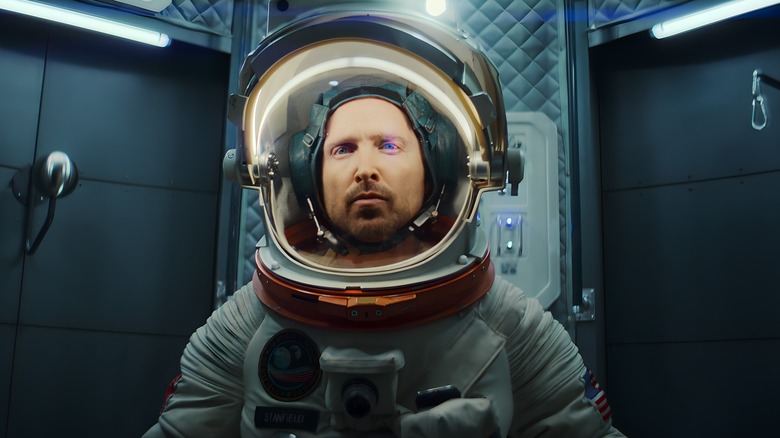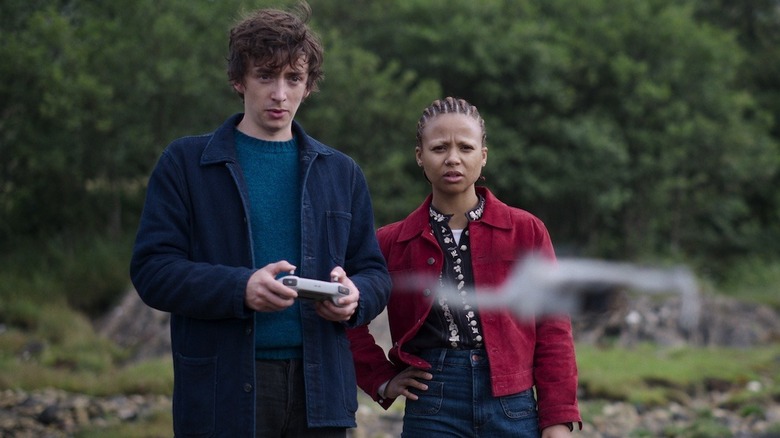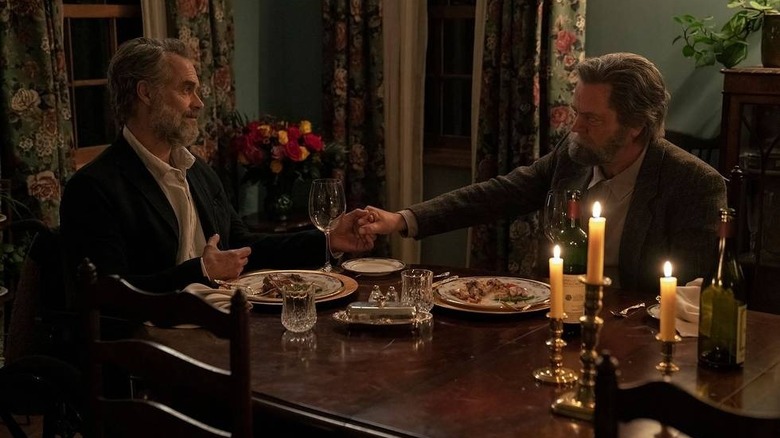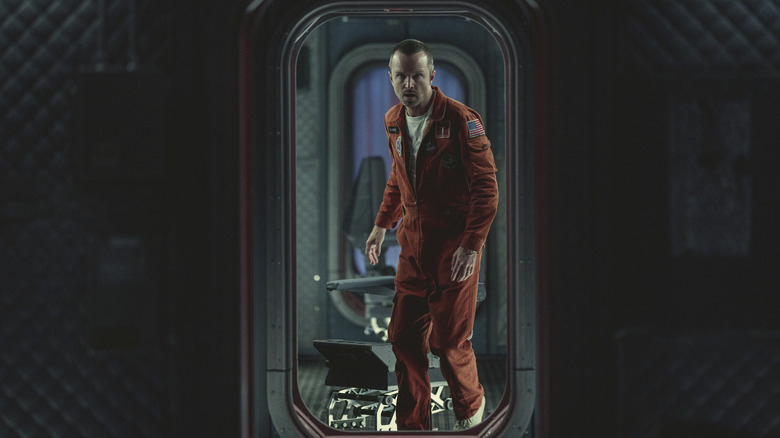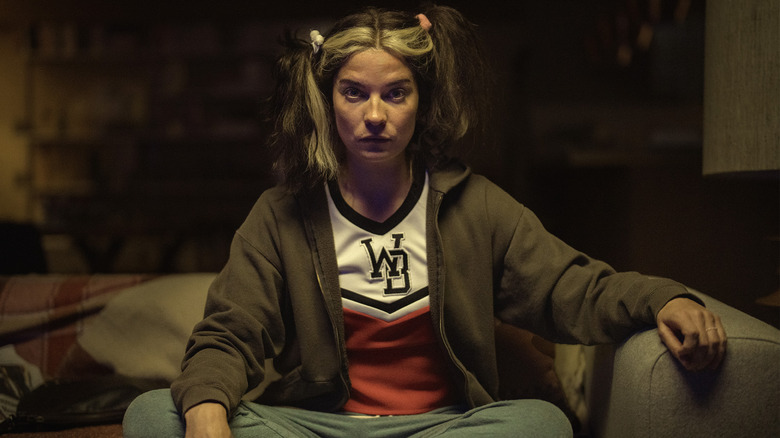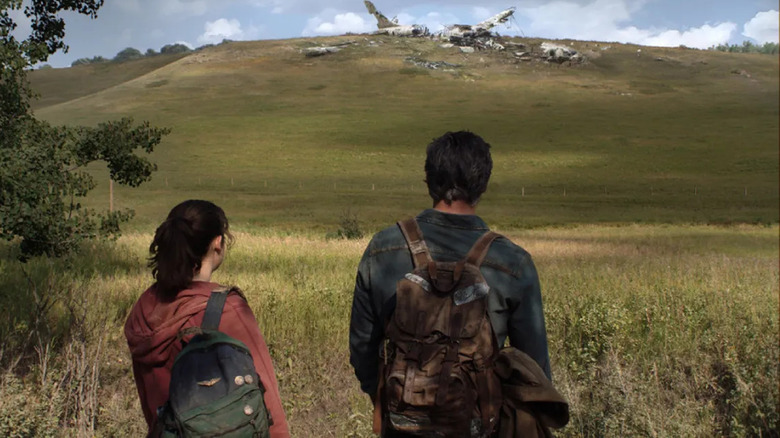Black Mirror Should Learn From The Last Of Us How To Balance Humanity, Horror, & Dystopia
Season 6 of "Black Mirror" dropped on June 15, 2023, after an incredibly long delay. The series and showrunner Charlie Brooker took a lengthy break due to a number of factors, chief among them being the real-world darkness brought about by the worldwide COVID-19 pandemic. As Brooker told the Radio Times in May of 2020, "I've been busy doing things. I don't know what I can say about what I'm doing and not doing. At the moment, I don't know what stomach there would be for stories about societies falling apart, so I'm not working away on any ["Black Mirror" episodes]. I'm sort of keen to revisit my comic skill set, so I've been writing scripts aimed at making myself laugh."
Jury's still out on whatever happened to Brooker's comedy scripts, but four years after the show's fifth season aired in 2019, the showrunner and his crew returned with Season 6. In many ways, this season is a return to form that honors the show's history, rife with callbacks to past episodes, and with a new lease on life. Some of its episodes really succeed, and some fall back on tired "Black Mirror" tropes — or invent entirely new ones.
Going forward, though, if Brooker and "Black Mirror" want to propel the show forward, they need to take some lessons from another prestige drama about mixing dystopian scenarios with very human situations. Specifically, "The Last of Us."
The sixth season of Black Mirror puts some of its focus on humanity, not technology
The whole gimmick of "Black Mirror" has traditionally been that technology is amazing, but also bad; the title of the show itself literally refers to the black rectangle we all stare at when our phone screen isn't lit up. From the worst uses of a Google Glass-type tech in "The Entire History of You" to a demented way to grieve in "Be Right Back" to the horrific video game in "Playtest" and beyond, "Black Mirror" imagines the most inventive technology and then immediately shows us how that could go horribly wrong with bad intentions.
By Season 5, relying extensively on this premise felt genuinely tired, which is why it's so refreshing that Season 6 spends a couple of episodes moving away from the central conceit of "technology = evil." The first episode, "Joan is Awful," does lean into that tech angle, but with an appealing twist; it's episodes like "Loch Henry," though, that rely on outdated tech like VHS tapes to tell a story about real, undeniable human evil that's far more gripping than an episode about astronauts with their own personal robots (more on that later, though).
This brings "The Last of Us" to mind in its execution, which is definitely a positive comparison. Being able to ground a heightened situation in real humanity is what the HBO hit does in its best moments, as well.
The Last of Us is a zombie show with a much larger story just underneath
When "The Last of Us" premiered in early 2023, it was billed as something more in the vein of "The Walking Dead" than anything else — a show defined by a global fungal infection that emerges from the Cordyceps fungus and ends up taking over the world. In the midst of that, consummate survivor Joel (Pedro Pascal), who loses his daughter at the beginning of the outbreak, is tasked with taking Ellie (Bella Ramsey), who appears to be immune to the infection and could also be a part of a potential cure, throughout the dangerous United States.
This certainly sounds like a show that'll be full of zombies and guns and unstoppable action, but in reality, the show spends much more time on the quieter parts of human existence in an apocalyptic world, and it's lovely. The standout episode of the first season — which, based on the quality of the entire season, is saying something! — is "Long Long Time," which diverts the action from Joel and Ellie to focus on Bill (Nick Offerman) and Frank (Murray Bartlett), two men who find love in a broken world and spend happy decades together before choosing their own ending. It's an emotional, beautiful hour of television filled with freshly grown strawberries, impeccably cooked dinners, and above all, companionship — and its message, in the end, is that human connection is all we have when the world turns sideways. And when "Black Mirror" is at its strongest, it accomplishes something similar.
The weakest parts of Black Mirror Season 6 relied too heavily on technology
When "Black Mirror" skews more towards "The Last of Us" and showcases the human experience instead of beating us over the head with the message that technology can be a net negative, it succeeds — and when it rests on its original concept too heavily, it flops. One of the weaker episodes of Season 6, "Beyond the Sea," tries to sell itself as an introspective look at the human experience and what it means to be intimate with another person, but it's still really about technology and how scary it can be. Two astronauts, Cliff (Aaron Paul) and David (John Hartnett) place their consciousness into robotic replicas in order to spend time with their families on Earth ... and after David's family is killed by an extremist cult angry at robots living among them, things get weird quickly.
When Cliff offers to let David use his replica to experience the world, it's easy to see where the story is going — David, in Cliff's body, will fall for Cliff's wife Lana (Kate Mara). Mixing this predictably melodramatic human tale with literal robots just doesn't work, and when the episode reaches its extremely gruesome conclusion, nothing about it feels earned. This was "Black Mirror" wanting to have its cake and eat it too, and it adds up to an unsatisfying episode that never quite gels.
The high points of Black Mirror Season 6 use the same tactic as The Last of Us
When "Black Mirror" rises to its best in Season 6, it takes the same tactic as "The Last of Us" and puts aside anything heightened, whether it's technology or even the supernatural, on the backburner to let the human experience take center stage in a real way. Even in the season opener, "Joan is Awful," the whole point is that somebody's mundane, problematic, and messy human life — specifically, Annie Murphy's Joan — is turned into a form of entertainment on a streaming service, which makes every single moment of her existence public and humiliating. It's still centered on Joan, until the twist comes that Annie Murphy also isn't Joan, but playing a real Joan in a different level — the actual Joan (Kayla Lorette) is somewhere in the bottom of this entire situation, and once Murphy's Joan breaks the system, they're both freed. Joan, in the end, even admits that she finally feels like the main character in her own story for the first time.
"Demon 79," the season finale, takes a similar approach by tasking Nida (Anjana Vasan) with a supernatural task after she finds a talisman that summons a demon — Gaap, played perfectly by Papa Essiedu — in that she has to kill three people before time runs out and the world ends. Even with a literal demon tailing her, Nida's struggles are still human as she grapples with casual racism in 1970s London, and her bond with Gaap is deeply human despite everything.
The Last of Us can — and should — inform Black Mirror's direction going forward
The best moments of the latest season of "Black Mirror" echo what "The Last of Us" managed to pull off spectacularly in its first season. To be blunt, "The Last of Us" is, pound for pound, a better show in many ways, but it's also difficult to fully compare anthologies with more traditional narratives. With that said, when "Black Mirror" succeeds, it reminds everyone that a super high-concept show can ground itself in the simplest and loveliest — or even most painful — human experiences, and all that will do is help it succeed.
"The Last of Us," in one very specific way, is lucky: it already has its path charted for it thanks to the acclaimed and beloved video game it's based upon. "Black Mirror," under Brooker, will have to pave its own way should it continue past Season 6 — and based on the positive reviews of the majority of the season, it feels likely that Netflix will give the series a green light to keep going. If and when that happens, Brooker should look at his own best episodes, see the balance "The Last of Us" is able to strike in those moments, and not lean so heavily on the titular black mirrors ... but instead, focus on the people staring into them in the first place.
